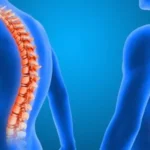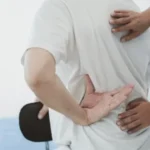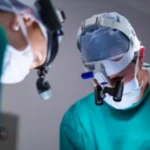Understanding Slipped Disc: A Common Yet Debilitating Condition
Doctors also call a slipped disc a herniated or prolapsed disc. It happens when the soft cushion-like tissue between backbones bulges out through a tear in the harder outer layer. Thousands of people in Delhi suffer from this problem every year. It can be very painful and make simple daily tasks hard to do. Finding a best doctor for slip disc in delhi plays a big role in healing and improving your lifestyle.

Sant Paramanand Hospital in Delhi focuses on treating spine issues with a complete care approach. Under the leadership of Dr. Amit Shridhar, who has expertise in treating disc issues, the hospital offers both non-surgical treatments and advanced surgical options if needed.
What Exactly Is a Slipped Disc?
The spine has 33 vertebrae stacked on top of each other with discs in between that help absorb shocks. Each disc has a tough outside layer called the annulus fibrosus and a soft -like center known as the nucleus pulposus. When the outer layer becomes weak or tears, the soft center can push through putting pressure on nearby nerves and causing pain.
Most often, this happens in the lower back or sometimes in the neck. Knowing how the spine works can help people see why visiting a specialist for slipped or herniated discs in Delhi is so important to get the right diagnosis and care.
Common Causes of Slipped Disc
Many things lead to disc herniation:
- Age-Related Wear and Tear: Discs lose water and become less flexible as people get older, which makes them more likely to tear.
- Bad Lifting Habits: Using your back muscles instead of your legs to lift heavy stuff puts too much pressure on spinal discs.
- Too Much Sitting Around: Sitting for long periods weakens core muscles and puts more strain on the spine.
- Being Overweight: Extra body weight adds stress to the spine and speeds up disc damage.
- Injuries From Accidents: Sudden movements or accidents can lead to a herniated disc right away.
- Family History of Issues: Some people inherit a tendency to have disc-related problems.
Warning Signs and Symptoms to Watch For
Spotting symptoms helps speed up treatment. Some common signs are:
- Back Pain in One Area: Pain, either sharp or dull shows up in the same spot and gets worse when moving around
- Pain Traveling Elsewhere: Pain moving down your arms (from neck issues) or legs (from lower back problems)
- Feeling Numb or : These feelings happen in hands, feet, or other areas when nerves get squeezed
- Weak Muscles: Struggling to pick up things or even walk if it gets really bad
- Bladder or Bowel Issues: Serious cases could point to cauda equina syndrome, which needs emergency attention
If you notice these symptoms, you should visit the best doctor to treat a slip disc in Delhi as soon as possible to stop it from getting worse or turning into a long-term problem.
Finding the Right Place for Your Slip Disc Treatment
Sant Paramanand Hospital is often seen as the best slip disc hospital in Delhi, offering modern facilities designed to handle all kinds of spine care. When choosing a hospital, focus on the following::
- High-tech diagnostic tools like MRI and CT scans
- Options for surgery and non-surgical treatments
- Therapy and rehab services
- Records of successful treatments and patient feedback
- Skills and experience of the medical staff
The hospital’s spine center provides complete care by bringing together experts in different fields. This includes neurosurgeons, orthopedic doctors, pain specialists, and physiotherapists who work together to treat patients and .
Diagnosis Methods: The First Step to Recovery
The path to proper treatment starts with understanding the issue. At Sant Paramanand Hospital, doctors use these approaches:
| Diagnostic Method | Purpose | Advantages |
| Physical Examination | Assess pain, reflexes, muscle strength, walking ability | Non-invasive, helps determine severity |
| MRI Scan | Provides detailed images of disc and nerve compression | Gold standard for visualization of soft tissues |
| CT Scan | Shows bone structures and can identify fragments | Useful when MRI is contraindicated |
| X-rays | Evaluates alignment and rules out other conditions | Quick, accessible initial screening |
| Electromyography (EMG) | Measures electrical activity in muscles | Confirms nerve involvement |
| Nerve Conduction Studies | Tests how well electrical signals travel | Identifies specific affected nerves |
Why You Need a Slipped & Herniated Disc Specialist
A Slipped and Herniated Disc Specialist in Delhi can create treatment plans suited to your condition. Dr. Amit Shridhar uses detailed assessments to make sure the care fits the individual’s needs before suggesting treatments.
Specialists offer you several benefits:
- Deep knowledge of how the spine works
- Expertise in both common and advanced treatment methods
- Skills to handle complex spine-related procedures
- Familiarity with modern developments in spine treatments
Modern Solutions for Slipped Disc Recovery
Treatment may involve non-surgical methods or surgery, depending on how serious the case is.
Non-Surgical Options
- Rest and Activity Changes: Taking a break or making adjustments to ease swelling
- Physical Therapy: Building strength in the back and core muscles
- Medication Options: Using painkillers, anti-inflammatories, or muscle relaxers
- Steroid Injections: Injecting steroids to calm irritated nerves
Surgical Options
- Microdiscectomy: Removing part of the disc through tiny cuts
- Endoscopic Discectomy: Performing the procedure with small tools and cuts
- Disc Replacement: Swapping the damaged disc with an artificial one
- Spinal Fusion: Connecting vertebrae together in tough cases
Modern herniated disc surgery in Delhi involves using advanced methods to shorten healing time and deliver better results.
Patient Success Story: Recovery Journey
To protect the identity of the patient, a pseudonym has been used.
Rajiv, a 42-year-old working in IT, struggled with severe lower back pain that spread to his left leg for months. Even basic things like sitting at his work desk felt unbearable. He sought advice from several doctors but found no relief. , he visited Sant Paramanand Hospital.
Dr. Amit Shridhar identified a large L4-L5 disc herniation pressing against the sciatic nerve. The initial treatment strategy included:
- Physiotherapy targeted at the problem
- Use of anti-inflammatory drugs
- Making changes to his daily habits
When conservative treatments helped only a little, Dr. Amit Shridhar suggested doing an invasive microdiscectomy. It lasted under an hour, and Rajiv was on his feet that same day.
“The relief came ,” Rajiv says. “In three weeks, I went back to my job, and after two months, I was playing badminton with my kids again. The thorough care I got changed everything.”
Frequently Asked Questions
Q: How long does it take to recover from slip disc surgery?
A: Recovery time depends on both the type of surgery and the person’s health. After invasive surgery, people might get back to light activities in 1 to 2 weeks. Bigger surgeries need about 4 to 6 weeks before resuming regular tasks. Complete recovery may take 3 to 6 months.
Q: Is surgery always needed to fix a slipped disc?
A: No most herniated discs around 80-90%, get better with simple treatments in 6 to 12 weeks. Surgery is an option when these other methods do not help ease the pain.
Q: What lifestyle changes can help avoid disc problems?
A: Staying active through regular workouts that build core strength, keeping a healthy weight using the right way to lift things, setting up workspaces with good posture in mind, and not sitting for too long can lower the risk a lot.
Q: How can I tell if my back pain is from a slipped disc?
A: a doctor can say for sure, but slipped discs often bring pain that spreads to your arms or legs. You might also feel numbness or tingling. Certain movements might make the pain worse, while specific positions could ease it.
Q: What sets Sant Paramanand Hospital apart in spine care? A: The hospital uses advanced technology along with diverse medical expertise and tailored care to each patient. Their thorough methods focus on both fixing the current issue and ensuring long-term spine health.
Prevention: Protecting Your Spine for the Future
While finding a great slip disc specialist in Delhi is important when facing issues, it’s always better to prevent them in the first place. Try these steps:
- Sit and stand with good posture anytime you move
- Choose supportive ergonomic furniture items
- Take small breaks from sitting for too long
- Build stronger core muscles with the right exercises
- Use safe methods when lifting heavy objects
- Keep your weight in a healthy range
- Drink enough water to keep discs healthy
Conclusion: Start Your Journey to Feeling Better
Dealing with disc pain affects daily life in many ways, but getting the right diagnosis and care often leads to major improvement. Sant Paramanand Hospital provides personalized slipped disc treatments in Delhi to meet individual patient needs.
If your back hurts or you have other related issues, meeting a spine specialist can give you answers and solutions. Dr. Amit Shridhar and the team at Sant Paramanand Hospital bring modern tools, and compassionate support to help patients live without pain again.
To book an appointment or learn more about available treatments, reach out to the spine center at Sant Paramanand Hospital .




Leave a Reply